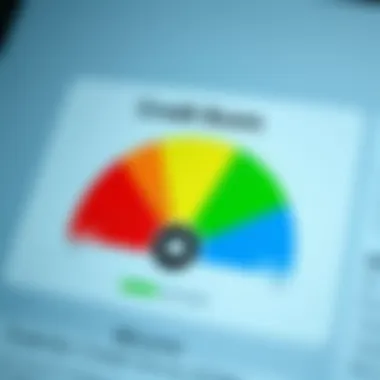Access Your Experian Credit Score for Free Today


Intro
Understanding your credit score is like having a secret key to your financial future. Among the three major credit bureaus, Experian stands out as a crucial player. Knowing your Experian credit score, and having the ability to check it for free, empowers individuals to take control of their financial destiny. Having a good credit score can open doors to better loans, lower interest rates, and even affect job opportunities.
In this guide, we’ll dive deep into how you can access your Experian credit score without spending a dime. We’ll cover the importance of knowing your credit rating, various methods and resources available for checking it, and tips for keeping your score in the green. Whether you’re a fresh graduate trying to build credit or someone looking to improve their score, this information is tailored just for you.
Preparation is key. By the end of this article, you’ll be well-equipped to tackle your credit health with a clear understanding of how to manage it effectively.
Understanding Credit Scores
Understanding credit scores is crucial for anyone looking to navigate the financial landscape. Whether you're a student just starting out, an entrepreneur seeking a loan, or an investor managing your portfolio, your credit score can have significant implications on your financial life. This section sets the stage for delving into the very fabric of what a credit score represents, reinforcing its relevance in today’s economy.
What is a Credit Score?
A credit score is a three-digit number that summarizes an individual’s creditworthiness. Imagine the credit score as a report card for your financial habits. Ranging from 300 to 850, this score encapsulates various factors derived from your credit history, such as timely payments, credit usage, and types of credit accounts maintained.
To receive a high score, one must demonstrate responsibility in managing credit. For instance, if you consistently pay your bills on time and keep your outstanding debts low, your score is likely to reflect that positive behavior. Conversely, if you miss payments or rack up high credit card balances, your score will take a hit, impacting your ability to secure loans at favorable interest rates.
Importance of Your Credit Score
Your credit score is more than just a number; it can dictate your financial opportunities. Here are some critical points to consider:
- Loan Approval: A higher score increases your chances of approval when applying for mortgages, car loans, or personal loans.
- Interest Rates: Lenders typically offer lower interest rates to individuals with better credit scores; this means you pay less in the long run.
- Rental Applications: Landlords often use credit scores as a deciding factor; a good score can help you secure a desirable rental property.
- Insurance Premiums: Some insurance companies consider credit scores when determining premiums, so a high score could lead to lower rates.
"Managing your credit score effectively could save you thousands over your lifetime."
In essence, your credit score plays a pivotal role in your overall financial health, guiding decisions that impact your ability to build wealth. Understanding your credit score is the first step towards mastering your finances.
Experian: A Major Credit Bureau
Experian holds a pivotal role in the financial landscape, acting as one of the primary credit bureaus in the United States. When it comes to understanding your credit history and managing your financial well-being, Experian is more than just a name; it’s a crucial resource for individuals seeking to navigate their financial journeys successfully. By grasping how Experian operates, you can better appreciate why accessing your credit score through their platform can be a game-changer in your financial strategy.
Role of Experian in Credit Reporting
Experian's importance in credit reporting cannot be overstated. As a credit bureau, it collects and houses data from various creditors about your credit activities. When a lender or financial institution assesses your creditworthiness, they often rely heavily on the information provided by Experian. This means that your credit score – a numerical representation of your credit reliability – is substantially influenced by the data that Experian collects.
Through credit reporting, Experian facilitates important financial decisions made by lenders. When you apply for a loan, a mortgage, or even a credit card, Experian compiles your credit history, including various financial behaviors, like timely bill payments, outstanding debts, and credit inquiries. This information helps lenders determine the risk involved in extending credit to you. A healthy credit history maintained with the help of Experian can lead to better loan terms or even approval in the first place.
Types of Information Collected by Experian
Experian aggregates a wealth of information, which can be broken down into several key categories:
- Personal Information: This includes your name, address, Social Security number, and date of birth. It is essential for verifying your identity.
- Credit Accounts: All your credit accounts, such as loans, credit cards, and lines of credit, are listed, including the date of opening, balance, and payment history.
- Payment History: This section showcases how reliably you've met your financial obligations. Did you pay on time, or do you have any delinquencies?
- Credit Inquiries: When you apply for new credit, it triggers an inquiry. Experian keeps track of both soft inquiries (like checking your own score) and hard inquiries (when lenders pull your credit report).
- Public Records: This includes bankruptcies, foreclosures, or other legal financial obligations that could impact your creditworthiness.
Understanding the nuts and bolts of what information Experian collects helps you see the bigger picture of your credit health. Each element plays a part in constructing your overall credit profile, ultimately affecting how lenders assess your dealings.
By keeping tabs on the information Experian collects, you can better manage your credit profile and stay attuned to any changes that might occur over time.
Knowing these details is vital for anyone looking to maintain a healthy credit score – or to credit-score management in general. If issues arise in your report, catching them early can head off more significant problems down the track. This importance cannot be emphasized enough, especially if you're preparing for significant purchases, such as a home or a vehicle.


With this understanding, let’s explore why accessing your Experian credit score for free is not just beneficial but necessary for sound financial management.
Why Check Your Experian Credit Score for Free?
In today's financial landscape, understanding and maintaining a solid credit score can mean the difference between securing a favorable loan or being stuck with higher interest rates, or even worse, being denied credit altogether. Knowing your Experian credit score for free helps you keep a pulse on your financial health and empowers you to make informed decisions. Accessing your score without any fee is a savvy move that allows you to understand where you stand among your peers and the general lending market.
Monitoring Financial Health
Checking your Experian credit score provides a window into your overall financial well-being. Your credit score gives insight into your ability to meet financial obligations and serves as a key factor lenders consider when determining your creditworthiness. Here are a few reasons why keeping tabs on your score is crucial:
- Early Warning System: Regularly monitoring your credit score can alert you to any significant changes, which might indicate potential financial problems or errors that need correction. A sudden drop in your score can be a red flag, prompting you to investigate further.
- Informed Financial Decisions: Knowing your score helps you evaluate which loans or credit cards you might qualify for. If your score is lower than desired, you can work on improving it before applying for major credit, thus enhancing your chances of loan approval.
- Benchmark Your Progress: Seeing how your score fluctuates over time can help you establish if your financial habits are improving. It's a practical way to track the effectiveness of your budgeting, bill payment habits, and credit utilization rate.
By monitoring your credit score for free, you can take proactive measures to maintain your financial health, eventually leading to better opportunities down the road.
Preventing Identity Theft
Another compelling reason to check your Experian credit score is to safeguard against identity theft. In an age where personal data is frequently compromised, keeping an eye on your score serves as a preventive measure. Here's how it plays a role in protecting you:
- Immediate Detection: If someone has stolen your identity, unusual activity such as unexpected credit inquiries can hint at potential fraud. By checking your score regularly, you can detect these anomalies early and take swift action.
- Filing Disputes: If you discover inaccurate information or unfamiliar accounts on your credit report, checking your score helps you identify errors swiftly. You can file disputes to resolve these issues and protect your credit rating.
- Peace of Mind: Knowing your credit score and keeping track of its status provides reassurance. You become more equipped to recognize signs of identity theft and can take necessary precautions to protect your personal information.
In summary, understanding your Experian credit score isn’t just about numbers; it’s about empowering yourself to monitor your financial health and prevent identity theft, thereby reinforcing your financial security and decision-making prowess. By checking it for free, you can ensure you remain in control of your financial future.
Free Resources to Access Your Experian Credit Score
Accessing your Experian credit score for free is a critical step in maintaining one’s financial health. Engaging with free resources allows individuals to stay informed about their credit status without incurring additional expenses. Understanding these resources enables proactive management of personal finances, particularly for those looking to improve or monitor their credit scores. This section highlights various means through which individuals can access their scores and the specific benefits each method offers.
Official Experian Website
The most direct route to access your Experian credit score at no cost is through the official Experian website. By providing an easy-to-navigate platform, Experian gives users access to their FICO score, which is the score most lenders use to evaluate creditworthiness. To get started, you typically need to provide personal information for verification - such as your name, address, and Social Security number.
Here’s how the process generally flows:
- Visit the Experian website.
- Create an account with basic personal details.
- Verify your identity, following prompts that may ask for your financial history.
- Access your credit score promptly after successful account creation.
Notably, using the official website ensures that you're getting the most accurate and up-to-date information, along with additional insights on improving your score.
Credit Monitoring Apps
Credit monitoring apps have fundamentally changed the way individuals access their credit scores. These apps not only provide users with their scores but also offer additional features that enhance the overall experience and understanding of credit health.
Top-rated Apps
Many credit monitoring apps stand out in the marketplace, but a few have gained a reputation for providing exceptional service. For instance, Credit Karma and Mint have established themselves as popular choices.
- Real-Time Monitoring: These apps often track your credit score changes in real time, providing alerts for significant shifts.
- User-Friensdly Interface: Many of these applications are designed to be intuitive, making it easy for anyone, regardless of tech-savviness, to navigate.
- Helpful Recommendations: They typically offer personalized tips on how to improve your score based on your unique financial behavior.
However, it’s essential to note that while these apps are incredibly beneficial, they might also include ads and suggest financial products based on your credit data.
User Experience


Another critical element of credit monitoring apps is the overall user experience. Customer feedback often highlights how these apps create a seamless experience.
- Ease of Access: Users can check their credit scores anytime and anywhere, thanks to mobile accessibility.
- Educational Resources: Many apps include educational material that breaks down credit concepts, making them easier to understand.
- Integration Features: Some apps even integrate with your bank accounts, allowing for a more comprehensive view of your financial health.
On the downside, if a user is not tech-savvy, they may find navigating these apps somewhat challenging at first. It's important for users to spend some time familiarizing themselves with the features to gain the most benefit.
Banks and Credit Unions Offering Free Scores
Many financial institutions, such as Chase and Discover, provide customers with complimentary access to their FICO scores. This means that if you have an account with one of these banks, you might be able to see your credit score with no strings attached. The benefit of getting your credit score through a bank is that it typically comes alongside your banking statements, integrating it into your overall financial picture. Therefore, checking your score becomes a seamless part of your financial management process.
Steps to Access Your Free Credit Score
Accessing your Experian credit score might seem like a daunting task, but it’s an essential step in taking control of your financial future. Knowing your credit score can significantly impact various aspects of your life—from securing loans to getting favorable interest rates. More than just a number, this score can dictate the terms of your financial opportunities. By understanding the methods to access your score for free, you can keep tabs on your credit health and make informed decisions.
Setting Up an Account
When it comes to checking your Experian credit score, the very first step is to set up an account. The process is relatively straightforward, but it comes with its own set of intricacies. Visit the official Experian website and look for options like "Get Your Free Credit Score". You’ll need to provide personal information including your name, address, date of birth, and Social Security number. This helps Experian verify your identity and ensure that the right information is being accessed.
Make sure to use a secure internet connection while providing your details; you wouldn’t want prying eyes snooping on your information. Once you’ve filled out the necessary details, expect a verification email or message to confirm your registration. Make it a habit to create a strong password; simply mixing upper and lower case letters with numbers and symbols can add an extra layer of unique protection to your account.
Navigating the Interface
Now that you've got your account set up, you might wonder how to navigate through the interface. When you log into your account for the first time, the dashboard will likely greet you with a friendly overview of your current credit score. Generally, the interface is designed to be user-friendly. Look for sections labeled "Credit Score Overview" or "Credit Report".
Here, you can usually visualize your score as a number, often supplemented by a color-coded range that indicates how well you fare on the scale from poor to excellent. You will also see segments showing the factors influencing your score, debts, payment history, and credit utilization. Familiarizing yourself with these sections will make it easier to understand your financial standing. Also, check for tips or guidance that can help improve your score—these can be quite valuable.
Understanding the Results
Finally, understanding the results displayed is crucial. The score you receive will generally fall within a range of 300 to 850, with higher numbers indicating greater creditworthiness. Decoding this score might require a bit of digging.
- Excellent (750 and above): You’re in a good place, and lenders view you favorably.
- Good (700 to 749): You’re doing well, but keep an eye on your habits to maintain this score.
- Fair (650 to 699): Actively working to improve your financial habits is essential here.
- Poor (below 650): You may face difficulties when seeking credit, so it may be wise to start making adjustments.
Additionally, pay attention to the insights provided. These may cover areas such as:
- Payment history: Have you made timely payments?
- Credit utilization: How much credit have you used versus your available credit?
- Length of credit history: How long have you had existing accounts?
By breaking down these elements, you’ll get a clearer picture of what factors are contributing to your current score.
"An informed borrower is smarter about managing credit."
Keeping a regular check on your credit score will empower you to make informed financial decisions and catch any potential mistakes early on. Knowing what your score consists of helps in crafting a path towards better financial health.
Frequency of Checking Your Credit Score
Monitoring your credit score regularly is crucial. People often think of their credit scores only when they need to make big financial decisions, like buying a house or securing a loan. But waiting until the last minute can lead to surprises that might cost you a pretty penny. Understanding how often to check your credit score, and the impact of checking it can guide you not just in maintaining a healthy score but also in making informed financial choices.
Optimal Frequency
So, how often should you be peeking at your credit score? The short answer is that it depends on your circumstances, but a good rule of thumb is to check it at least once every three months. If you are planning to make a significant financial move, like purchasing a home or car, you might want to check it more frequently. Here’s a deeper dive:


- Quarterly Checks: For most people, quarterly checks suffice. You can catch any inaccuracies or changes without feeling like you’re obsessing over the number.
- Pre-Application Checks: If you’re applying for a credit card or loan, consider checking your score about a month ahead of the application. This gives you time to address any problems that may crop up.
- Life Changes: Big changes, like a new job or a recent move, may impact your finances. In these situations, a monthly check might be wise to ensure your score stays aligned with your financial plans.
A consistent check on your credit score allows you to become familiar with what affects it, so you can make proactive changes rather than reactive ones.
Impact on Score
You may have heard that checking your credit score can actually ding it. This isn’t entirely true. There are two types of inquiries: hard inquiries and soft inquiries. Understanding the difference helps clarify how frequent checking might affect your score.
- Soft Inquiries: These occur when you check your own score or when a lender checks it for pre-approval. Soft inquiries don’t affect your credit score at all, so feel free to check your score as much as you like through authorized resources!
- Hard Inquiries: These happen when you apply for credit. While they do cause a small, temporary dip in your score, multiple hard inquiries over a short period can raise a red flag. However, if you're shopping for the best loan or credit card deals, most scoring models treat these inquiries as one if made within a short time frame, typically 14 to 45 days depending on the model.
In sum, your credit score is not something to fear. Regularly checking it can be a part of your routine that helps ensure you're on the right financial track. Paying attention to how often you check and what kinds of inquiries you’re making will help safeguard your score while giving you a finger on the pulse of your overall financial health.
For those wishing to delve deeper into this topic on a broader scale, consider visiting Annual Credit Report for more insight into managing your credit profile effectively.
Maintaining a Healthy Credit Score
Having a healthy credit score is crucial for financial stability. It's not just a number; it carries weight when it comes to loans, mortgages, and even jobs. The higher your score, the better loan terms you can snag, potentially saving you thousands in interest over time. Consider this: a little diligence in managing your credit health can open many doors in life.
When you maintain good credit health, you not only improve your financial resilience but also enhance your overall financial reputation. Some might say, "a good credit score is like a ticket to the financial fast lane," allowing you to navigate through life's big purchases with ease.
Best Practices for Credit Health
To keep your score in tip-top shape, consider the following best practices:
- Regularly check your credit report. Knowledge is power. Ensuring your report is accurate helps you catch errors that could drag your score down.
- Pay bills on time. This is one of the most significant factors affecting your score. Set reminders for due dates or automate payments if possible.
- Keep credit utilization low. Ideally, you want to use less than 30% of your available credit. This shows lenders you're not overly reliant on credit.
- Limit new credit inquiries. Each time you apply for credit, it can cause a small dip in your score. Keep applications to a minimum, especially when planning to make a big purchase soon.
- Diversify your credit mix. A combination of installment loans (like auto loans) and revolving credit (like credit cards) can positively impact your score.
Following these practices can keep your credit score robust and ready for any financial opportunities that come your way.
Common Mistakes to Avoid
While there are best practices to embrace, it's equally important to steer clear of common pitfalls:
- Ignoring your credit report. Failing to monitor your credit can lead to undetected errors, which could skew your score unfavorably.
- Making late payments. This mistake can have long-lasting effects on your score, especially if you're frequently late. Even a single late payment can stay on your report for years.
- Closing old credit accounts. Think twice before closing an old credit line. It can negatively affect your credit utilization ratio and your overall credit history length.
- Applying for several credit cards at once. Doing this may raise flags for lenders, impacting their view of your creditworthiness.
- Not understanding credit factors. It's essential to know what influences your score—education can help you make more informed decisions about your credit.
"A penny saved is a penny earned." Similarly, maintaining a sound credit history ensures you're not spending extra on interest and insurance premiums, thus safeguarding your financial future.
By being mindful and informed about how to maintain and optimize your credit score, one can navigate the sometimes tricky waters of financial opportunities with greater confidence and success.
End
Understanding how to access your Experian credit score for free is not just a matter of convenience; it’s a vital aspect of maintaining overall financial health. As we’ve detailed, knowing your credit status can empower you to make informed decisions regarding loans, mortgages, and even employment opportunities. Moreover, it enables you to monitor for any unusual activity that might indicate identity theft, a rising concern in today's digital age.
Recap of Key Points
In this guide, we navigated through several critical areas:
- Understanding Credit Scores: We clarified what a credit score is and why it matters, serving as a cornerstone for healthy financial management.
- Resources for Accessing Your Score: We explored various avenues, including the official Experian website and different credit monitoring apps. These resources provide easy access at no cost, ensuring that users stay informed.
- Steps to Access: The step-by-step breakdown on setting up an account and interpreting the score laid out a clear path for users.
- Maintaining a Healthy Score: Best practices for credit health and common pitfalls to avoid can significantly impact your financial standing.
It's essential to take these insights into consideration as you forge your financial future. Not only does regular monitoring allow for better financial planning, but it solidifies your position against potential financial pitfalls.
Final Thoughts on Credit Score Management
Managing your credit score should be viewed not as a one-time task but as an ongoing responsibility. Treat it like you would a garden—requiring regular attention, pruning, and nurturing to yield the best results. Regularly checking your credit score helps you stay in tune with your financial landscape and make proactive adjustments when necessary.
Consider that your credit score is a reflection of your financial behavior. By adopting solid habits—like making payments on time, keeping debts low, and avoiding unnecessary credit inquiries—you can cultivate a robust credit profile that enhances your financial options.
Ultimately, by engaging with your Experian credit score and utilizing the resources available, you're taking a decisive step towards securing your financial future. Keeping an eye on your score opens doors and gives you the confidence to navigate any financial journey ahead.



